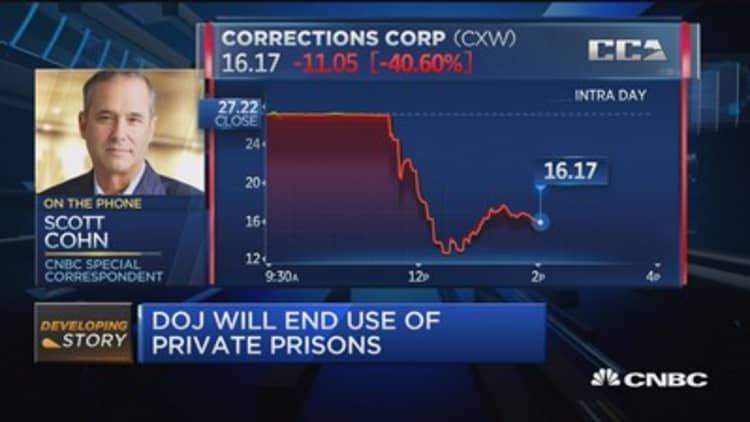
Investors sent private-prison stocks spiraling Thursday, but analysts say the selling might be overdone.
The two main companies in the private-prison business plummeted by as much as 50 percent Thursday after the Department of Justice announced the Bureau of Prisons will be phasing out contracts with them. GEO Group shares closed down 39.58 percent and Corrections Corporation of America closed down 35.45 percent.
"While our company was disappointed by today's DOJ announcement, the impact of this decision on GEO is not imminent," a GEO representative said, in a statement. "As acknowledged in the announcement, the BOP will continue, on a case-by-case basis, to determine whether to extend contracts at the end of their contract period."
Analysts following the company echoed the statement, downplaying the severity of the announcement.
"While this is no doubt negative news, the intraday stock reaction seems like overkill," Canaccord analyst Ryan Meliker said, in a research note.
First, the plan only affects correctional facilities run by the Bureau of Prisons, which represent only a fraction of each company's business.
It also does not affect the contracts the companies have with other federal agencies, such as U.S. Marshals or Immigration and Customs Enforcement. Nor does it affect state contracts, which account for a significant portion of revenues.
Meliker said Bureau of Prisons contracts make up about 11 percent of GEO's business, when excluding interests in halfway houses; Bureau of Prisons contracts make up even less of CCA's revenue.
In a statement, CCA said the Bureau of Prisons contributes 7 percent of its revenues.
Tobey Sommer and Kwan Kim of SunTrust Robinson Humphrey maintained their "Buy" rating on GEO Group and their neutral rating on CCA. They estimate that if the Bureau of Prisons brings the prison business back under government control, the companies could lose at least 10 percent of adjusted earnings.
Still, that won't happen right away. Sommer and Kwan believe the Bureau of Prisons "will evaluate each facility at the time of its contract renewal date, taking into account the quality of each facility and the agency's overall needs."
There are also some logistical issues that could slow down, or even prevent, a full transition away from private prisons.
"We note that the feasibility will make the process longer than most expect," Meliker wrote in his note. Bureau of Prisons facilities are already crowded, and removing the private facilities would push capacity up to 143 percent, which is above the federal mandate for 137.5 percent by almost 9,000 prisoners.
"As such, we believe the ability to take away beds will be much more limited than the market currently is reacting to," Meliker wrote.
The risk, of course, is that states and other federal organizations might follow the Bureau of Prisons' lead and start pulling out of their contracts, too.
Both CCA and GEO are technically real estate investment trusts and have been moving into other businesses already.
CCA has a "real estate-only solution helps government deliver needed facility space in a cost-effective manner while providing its own staffing and management services," according to a statement sent to CNBC. "We've also greatly expanded our residential re-entry offerings, which help inmates prepare to successfully return to their communities."
The federal government isn't just ditching the private-prison business immediately or altogether, so investors should keep watch.



